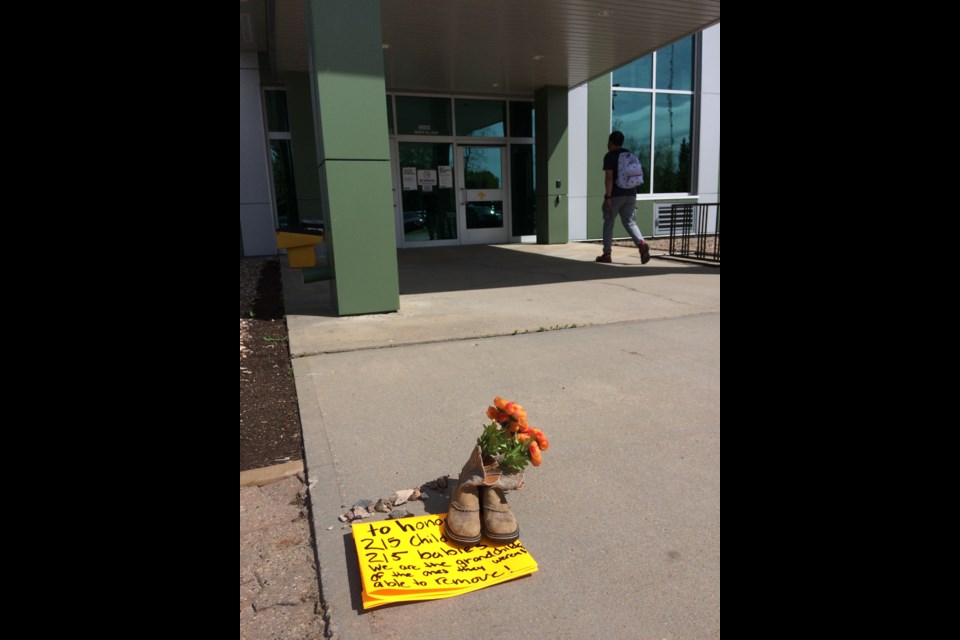Opening Tuesday’s Lac La Biche County council's regular meeting, councillors joined municipal officials across Canada by holding 215 seconds of silence to remember the 215 Indigenous students who lost their lives while attending a government funded residential school in Kamloops, BC.
Lac La Biche County Mayor Omer Moghrabi addressed councillors before the regular meeting got underway, asking to include the moment of silence at the beginning of the meeting's agenda. Across the municipality, flags have also been lowered for 215 hours, approximately nine days.
The actions of the Lac La Biche County council on behalf of its residents are to pay respects to the 215 children whose remains were discovered this week on the site of a former British Columbia residential school that operated from 1890 until the second half of the 20th Century.
"We are the grandchildren of the ones they weren't able to remove!"
— a sign left with boots, rocks and flowers outside Lac La Biche Provincial Building
Along with the municipal tributes, several local tributes were visible in and around the community, including a pair of faded small boots, a pile of stones and flowers left with a small sign outside the Lac La Biche Provincial Building on Tuesday morning. The sign read: "To honour 215 children 215 babies. We are the grandchildren of the ones they weren't able to remove!"
The Provincial Building houses local regional offices of several provincial government departments including Alberta Parks, children's mental health services, employment services, Indigenous health services, and a provincial courthouse,
Lac La Biche County is home to the Lac La Biche Mission Historical Site, currently a provincial and national historic resource that was once a residential school, boarding students from the late 1800s to the 1970s. The Lac La Biche Mission residential school is listed among the country’s formal residential schools by the Truth and Reconciliation Commission’s. The Mission was operated by Oblate nuns and the Catholic church as a school and working farm, with Western Canada’s first production wheat field, as well as some livestock. The site originally included a schoolhouse, church, convent and rectory. The rectory burned down a decade ago.
The Lac La Biche Mission site has recently been the location for Canada Day celebrations in the municipality. Lac La Biche County councillor George L’Heureux is the current president of the Lac La Biche Mission Historical Society. A Lakelandtoday.ca interview with Lac La Biche Mission officials is in progress.
The last residential school in Canada — a location in northern Saskatchewan — closed its doors in 1996.
Widespread reaction
In British Columbia, the Kamloops Indian Residential School site is now being considered a mass grave by the Tk’emlúps te Secwépemc First Nation, after the remains were found with the use of ground-penetrating radar last week.
“[Our First Nation Peoples] need real progress from governments, institutions and from every one of us toward real reconciliation,” he said.
In response to the finding, Alberta’s Minister of Indigenous Relations Rick Wilson said, ““The discovery of 215 lost children at the Kamloops Indian Residential School site heightens the need to take action.”
Lac La Biche County officials will be be consulting the area's indigenous leaders following the announcement of the findings, according to L’Heureux.
Orange reminder
Canadians nationwide are wearing orange shirts this week as a tribute for the 215 children that never returned home after attending the Roman Catholic residential school in Kamloops.
Orange Shirt Day has been held nationally on September 30 of each year since 2013 as a tribute to residential school students and survivors. The day of recognition carries the theme, “Every Child Matters.” Orange Shirt Day’s origins trace back to a BC woman,Phyllis Jack Webstad, a residential school survivor who attended a mission school run by the Catholic Church in rural BC in the early 1970s. Recounting her first day of residential schooling as a six-year-old, Webstad describes in her online testimonial of being stripped of her clothes, including the new orange shirt she had been given by her grandmother.
According to the National Centre for Truth and Reconciliation, an estimated 150,000 children across Canada attended residential schools from the early 1800s to 1996. The same archives — based on death records filed — show that 4.100 children died at the schools.
*with files from Rob McKinley
Read more from LakelandToday.ca



